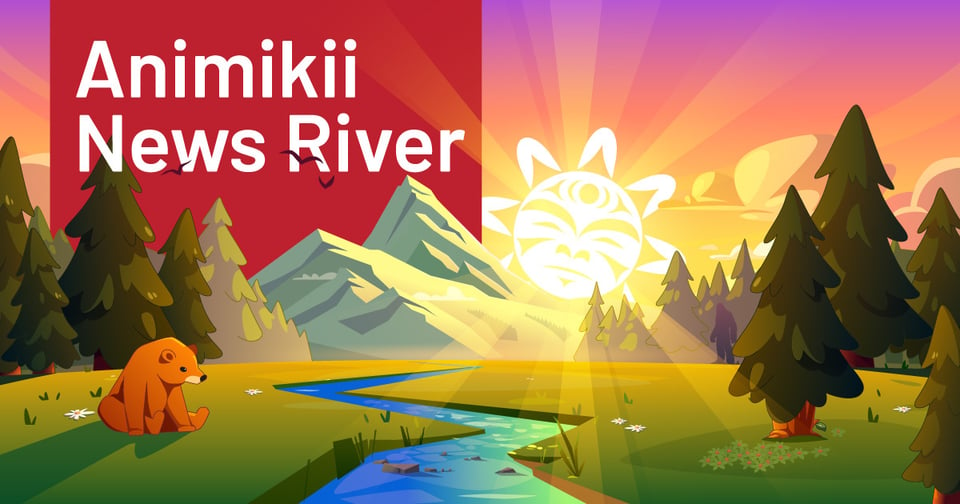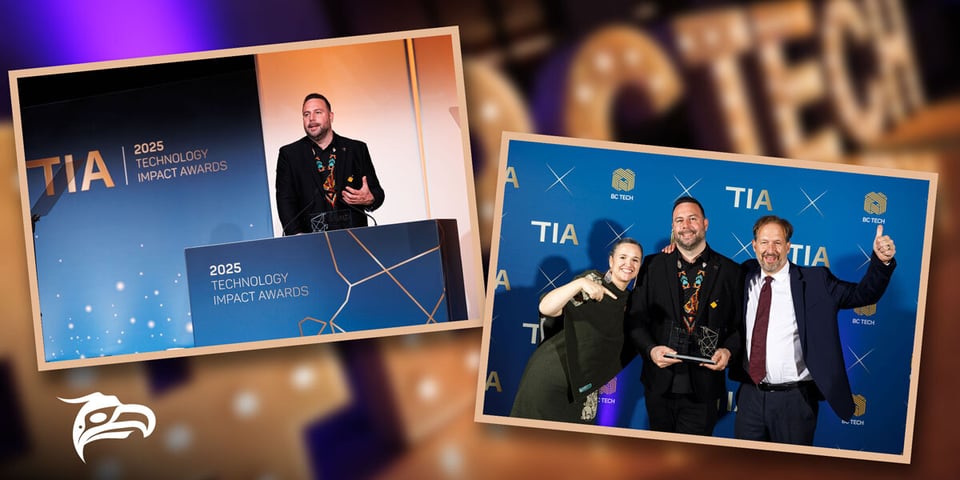Technology that respects technical standards and Indigenous protocols
What are the implications of cultural heritage discovery via code, or the use of LLM's on depth of learning?

Boozhoo News River Readers,
This week we’re highlighting the importance of centring our culture in our work and how mainstream tech is taking notice.
We also want to acknowledge the important work happening in communities and organizations in all sectors that often goes unrecognized. The work you do, and the ways that you do it - matter.
We appreciate you for being here alongside us!
This week’s stories include:
What does it mean to “discover” cultural heritage on others’ lands through code?
The effects of using large language models (LLMs) versus traditional web search on depth of learning.
How the country’s growth and innovation depends on how it includes Indigenous peoples in both decision-making and ownership.

Jeff Ward on Winning a Gamechanger Award for Company Culture
The big picture: Animikii was recently recognized at the BC Tech Technology Impact Awards (TIA) as a game changer in company culture. We were recognized at a mainstream tech awards show for being a tech company that happens to be Indigenous. I hope our platform and impact is shifting views on Indigenous Peoples in tech. We create startups, we take venture capital, we scale up, we launch SaaS, we compete on the world stage… and we win tech awards 🤗
Why it matters: Our team shows up every day to work on Indigenous data sovereignty. We are building Niiwin, our platform that keeps data control in Indigenous communities' hands. We have created technology that respects both technical standards and Indigenous protocols. This win belongs to our team members who make this work possible. It belongs to the Indigenous communities who trust us with their data and their stories. That's the culture BC Tech recognized last week.
Key points:
We started as a web development agency. Now we're a software platform company. Our constant guiding light? Centering Indigenous perspectives in everything we build.
We're committed to fostering a positive work environment through thoughtful policies and compassionate protocol. We strive to integrate our values into as many areas as possible including: HR policies, gifting, gatherings, contracts, intellectual property, funding structures, impact reporting, and many other aspects of how we work together.
Some examples of what we offer staff include: Substituting Statutory Holidays, Community Love Days, Paid Winter Solstice Closure, Introduction to Cultivating Safe Spaces as well as Sanyas Indigenous Cultural Safety Training.
What they’re saying: “Winning this TIA is a reflection of how our Thunderbirds center love-based practices every single day. Shifting industry norms may be the harder way to do business but I wouldn’t want to do this any other way. Colonial capitalism was meant to be fear-based, extractive, and isolating and we’re trying to be love-based, generative and inclusive. Inclusivity of everyone: Indigenous, Non-Indigenous, All Our Relations.” Jeff Ward
Learn more: View a full list of BC Tech 2025 Technology Impact Awards Winners here.
Curated Articles:
Data Sovereignty vs. Digital Prospecting
“Now, for the first time in history, anyone can conduct archaeological research,” or so promised artificial intelligence giant OpenAI in a recent promotion-via-public competition. Marketed as an Indiana Jones–style adventure, the “OpenAI to Z Challenge” invited users to digitally scour the Amazon rainforest for archaeological treasure. The contest leaned heavily on colonial archives and Indigenous oral histories, repackaged as “open data” ready for algorithmic mining. But what does it mean to “discover” cultural heritage on others’ lands through code? And where were the safeguards to ensure that communities’ rights and cultural heritage were protected? Contestants, branded as “digital explorers,” mined satellite imagery, lidar scans, and Indigenous maps to locate sites. Such digital “prospecting” evokes a long history of outsiders extracting knowledge and artifacts without consent. Many of the so-called “open” datasets used in the competition were created by governments or corporations without consulting affected communities. While no Indigenous groups have yet publicly objected to this specific contest—perhaps because no physical interventions have taken place—the absence of consultation itself is part of the problem. Such broad data usage ignores Indigenous Data Sovereignty principles, which call for community control over data about their lands and heritage.
Canada’s health data is flowing abroad while Ottawa stalls on AI rules
As AI tools spread in health care, federal legislative delay threatens privacy, Indigenous sovereignty and public trust. The former Trudeau government’s Artificial Intelligence and Data Act, part of the larger Bill C-27, died when Parliament was dissolved earlier this year for the April election. It has not been reintroduced, leaving Canada lagging other countries in dealing with important issues of data sovereignty, especially in health care. These issues are critical and urgent. AI tools are already being used in pilot projects in frontline health services across the country. In some Northern and rural clinics, transcription software is being tested in counseling and wellness sessions. This is not just a tech issue. It is about sovereignty, health and trust. Indigenous nations have long articulated principles for responsible data governance, best captured in the OCAP principles (ownership, control, access and possession). Yet AI pilot projects in health care rarely consider these frameworks. In my work with Northern communities, I have seen how digital tools often arrive with little pre-consultation on governance – a gap that echoes colonial decision-making.
Experimental evidence of the effects of large language models versus web search on depth of learning
The effects of using large language models (LLMs) versus traditional web search on depth of learning are explored. A theory is proposed that when individuals learn about a topic from LLM syntheses, they risk developing shallower knowledge than when they learn through standard web search, even when the core facts in the results are the same. This shallower knowledge accrues from an inherent feature of LLMs—the presentation of results as summaries of vast arrays of information rather than individual search links—which inhibits users from actively discovering and synthesizing information sources themselves, as in traditional web search. Thus, when subsequently forming advice on the topic based on their search, those who learn from LLM syntheses (vs. traditional web links) feel less invested in forming their advice, and, more importantly, create advice that is sparser, less original, and ultimately less likely to be adopted by recipients.
The rise of Indigenous-led innovation in Canada
“We’re pro-moving forward. We’re pro-accelerating, but in the right way that actually allows for Indigenous communities to both benefit and also be at the table to be part of those conversations,” says Josh Gray, co-founder and CEO of Arlo Health, and member of the Wahnapitae First Nation. Speaking at Elevate Festival in Toronto alongside Althea Wishloff, general partner at Raven Indigenous Capital Partners and member of the Gitxsan First Nation, Gray said the country’s growth depends on how it includes Indigenous peoples in both decision-making and ownership. The conversation tackled what the Indigenous economy looks like in 2025, a year defined by both opportunity and tension. On one hand, major federal programs are expanding Indigenous access to capital and procurement. On the other, new infrastructure legislation has raised concerns about how consultation is being handled. “It’s been a tumultuous time,” said Wishloff.
TELUS and Indigenomics partner to advance Indigenous economic outcomes using sovereign AI
TELUS and Indigenomics today announced a partnership to support Indigenous economic advancement and innovation. Indigenomics will leverage TELUS' highly secure, state-of-the-art Sovereign AI Factory to accelerate the development of IndigenomicsAI – an Indigenous economic intelligence platform designed to measure, mobilize and amplify Indigenous economic activity – while helping keep Indigenous data, knowledge and intellectual property secure. Through access to TELUS' high-performance AI compute power at its Rimouski, Quebec facility, Indigenomics will leverage the advanced GPU technology to train AI models, conduct research on the sizing of the Indigenous economy and develop AI-driven economic development tools that elevate Indigenous voices and perspectives in business and leadership.

Add a comment: